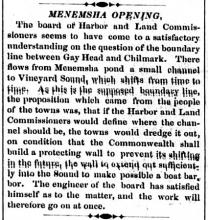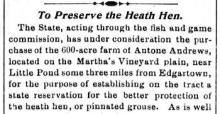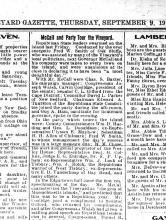In a friendly but eloquent mixture of encouragement, advice and warning to the whole Island, Secretary of the Interior Stewart L. Udall formally dedicated the colorful clay cliffs of Gay Head as a National Landmark on Saturday afternoon.
“Don’t build that bridge,” he said, in reference to a proposal put forward recently by Boston’s Automobile Legal Association; “It’s a silly idea...keep the roads the way they are, don’t let the highway engineers build you some high speed roads...preserve your historic places...keep the beautiful beaches and marshes unspoiled...and above all else...keep out the speculator-developer types.”
Some 500 people and a raft of dignitaries turned out under partly cloudy skies for the dedication services. At the opening of his remarks, Secretary Udall explained that the dedication of the site as a National Landmark did not place it under the administration if the Department of Parks or the state park system. “It remains under the custody and care of the local people. And I want you to dwell on that for a moment, because it seems to me...that you need a program to conserve this as a scenic resort. If you simply allow people to use it at will, it will ultimately be defaced and possibly destroyed.”
“Our Advice Is Free”
He went on to offer the selectmen of Gay Head the services and advice of his department, “because our advice is free—in fact, you are free to ignore it if you want to—on what we would do with this site if it were part of the National Park system—at least what kind of simple management plan you could have here in terms of preserving it, in terms of making the public respect it, and of seeing to it that it is used and not abused.”
The bulk of the Interior Secretary’s remarks were addressed to the larger question of preservation of the Island itself. He described himself as a newcomer to the Vineyard, and volunteered his remarks “merely as one passing through, who has some acquaintance with the conservation problems and conservation opportunities in the other fifty states”. It was clear from his remarks that he had seen a great deal during his stay.
“I said to a group last night that I thought if he were alive today, that Henry David Thoreau—the great naturalist of New England, of the world really—would be pretty distressed at what we’d done to the beauty of our land. And I think that there are perhaps two or three places that if he were alive he might with some equanimity want to come to live. I certainly think Martha’s Vineyard is one—and perhaps there are some of the unspoiled places on Cape Cod. I suspect northern Maine, the Allegash country, would be another —that he would find these places pretty much the same as they were a hundred years ago. But these places are rare, and getting rarer.
Something Very Special
“Certainly you have here—not only in Gay Head but in this whole Island—something that is very special. The reason that it is especially prized by so many people—the reason so many people come to see it for a day or to stay a month or all summer—is that it is largely unspoiled. And the question is—how do you keep it unspoiled? How do you prevent here the type of spoliation that has taken place in so many parts of our country?
“I would certainly suggest, above all else: Don’t build that bridge.”
This was greeted with applause.
“It’s a silly idea. An Island should be an Island—that’s one of its special charms. I can’t think of anything that would wreck it quicker than a bridge. So I would urge all these dignitaries here—they are the ones that make the decisions, your representatives—let’s have no more such talk as that. Let’s keep Martha’s Vineyard an Island.
“I would further suggest—if I may offer another thought or two—keep the roads the way they are, don’t let the highway engineers build you some high-speed roads. The charm of the Island is a small town charm: the fact that the cars, because the roads wind around, can’t go too fast; that bicycles are welcome; and that hitch-hikers can always get a ride—all of them from 4 years old and up —whether they have a towel or not. That is a type of charm that is very precious.
“Preserve your historic places, the historic buildings. This is something we’re belatedly discovering in this country. We’ve been so busy making history, we haven’t realized until lately that we were destroying vital symbols of our past.
Keep Them Unspoiled
“I would suggest also, in terms of the beautiful beaches and marshes that you have here—keep them unspoiled if you can. These are the things, the view, the unspoiled condition, that one finds here.
“But above all else—and this is almost as important as the bridge—if you can, keep out the speculator-developer types, because they’ll wreck the Island too.” Again there was prolonged applause.
Secretary Udall said that he had brought no pat answers, that he wasn’t prepared to say whether “there is some large or small part that should be done by the national government, by the National Park system, or by my own department”.
“I know that it will take wise men, wise selectmen, wise people in the legislature, and Wise people in the state to do the job of preservation and conservation that must be done here,” he said. “But I think the most important thing at this point is that there be a strong determination by the people—all the people who love this Island, whether they be Islanders, natives, or those who merely pass through—determination at this late hour to keep this very special place of America unspoiled.”
In closing, Secretary Udall urged the whole Island to adopt a conservation plan. “I would like to think that this designation here today, this little ceremony that we’re performing—it isn’t important in itself, but it is important if it imparts to all of you, particularly those of you who live here the year round, a desire, a determination to perfect a conservation plan not only for Gay Head but for the whole Island—to keep it unspoiled, to keep it one of the magnificent places of America.”
Although Secretary Udall in his speech put the accent on the need for positive local leadership, in private conversations during the past ten days he has stressed the flexibility of the National Seashore scheme worked out on Cape Cod, and the possibility that some extension of it might be made to include certain beach and marsh areas not only on the Vineyard but the Elizabeth Islands as well.
Seashore Head Here
The presence at the ceremonies of Stanley Joseph, superintendent of the Cape Cod National Seashore, and the invitation to the Gay Head selectmen to meet with Mr. Joseph to work out a “management plan” for the cliffs, indicated the Interior Department’s willingness to enter any “open-minded discussion” of the subject. However, speaking after the ceremonies, Secretary Udall made it clear that the initiative for any extension of the Cape Cod National Seashore to Martha’s Vineyard, which would require an act of Congress, must come from th elected representatives of the area.
He credited the Cape Cod National Seashore with “stabilizing” a situation which, if unchecked, would have resulted in the commercial development of Cape Cod to the exclusion of all other values - scenic, recreational, residential, etc. “You do not have a stable situation here,” he said, and explained that by “stable” he meant the legal stabilization of the Island, as by zoning by-laws, the setting aside of certain scenic areas and an overall development plan which would rationalize the inevitable growth of the area in the decades to come. (As it happens, the State Senate has before it a Bill (No. 693) to Establish a Planning and Economic Development Commission for the County of Dukes County.)
At the end of his address, Secretary Udall unveiled the bronze plaque designating the cliffs a National Landmark. It cites the cliffs’ “exceptional value in illustrating the natural history of the United States of America”.
Leonard Vanderhoop, Gay Head selectman, son of the only Indian to sit in the Massachusetts legislature, made a brief speech of acceptance “on behalf of the people of Gay Head”. He said he was “pleased and proud of this great honor, since my forefathers were among the original inhabitants of this magnificent area, known then as Aquinnah, now as Gay Head. Being born and raised here on this colorful headland, I roamed the cliffs and seashores, so I am doubly pleased and proud of being able to accept this plaque on behalf of my townspeople.”
Luther Madison Presides
Luther Madison, chairman of the Gay Head selectmen, presided at the ceremonies, which began just a few minutes after the scheduled 2 o’clock starting time. After the singing of the national anthem by Helen Attaquin, whom he introduced by her Indian name, which means Running Water, Mr. Madison introduced Russell Gardner, Great Moose of the Federated Eastern Indian League, who gave the invocation - reciting the Lord’s Prayer in the Wampanoag language.
Next introduced was Mrs. Russell Vanderhoop Gentry, who gave a brief review of Gay Head’s past, tracing the history of the Indian settlement from before Gosnold to the present, from the post-revolutionary days when the Gay Headers were “involuntary wards of the state” to their full and active citizenship today. She mentioned the contributions of the Gay Headers who gained fame as boatsteerers in the era of whales and whaleships, and the most recent contributions of the late silver-star winner, Nathan Francis, and of Douglas Vanderhoop, who earned the Purple Heart in Vietnam.
Rep. Hastings Keith, Lieutenant Governor Elliot Richardson, Attorney General Edward Brooke, and Rep. John G. Clark addressed brief remarks to the gathering before Secretary Udall’s presentation speech.
The ceremonies were conducted on top of the World War II pill box, overlooking the cliffs, Devil’s Bridge, Vineyard Sound, and the Elizabeth Islands beyond. Among the honored guests seated on the platform in addition to those already mentioned were former Gov. Endicott Peabody, Rep. Benjamin C. Mayhew Jr., Sen. Allen Jones, the county commissioners, and C. Earle Vanderhoop, the third Gay Head selectmen.
On the bank above the platform, seated in three rows of chairs, were thirty or so modern Wampanoags in tribal regalia. Secretary Udall paid tribute to them in his opening remarks. “I want you know that I feel a bit at home - I’ve been here for ten days, I have a Chilmark suntan, I have my Indians in back of me, I have my commercial fishery ahead in the open water.”
Secretary Udall then said that his wife was also present, and introduced her, and “I have several children here, but I suspect they’re at the beach, where most of us ought to be.”
The benediction was given by Rep. Edward A. Bullock.











Comments